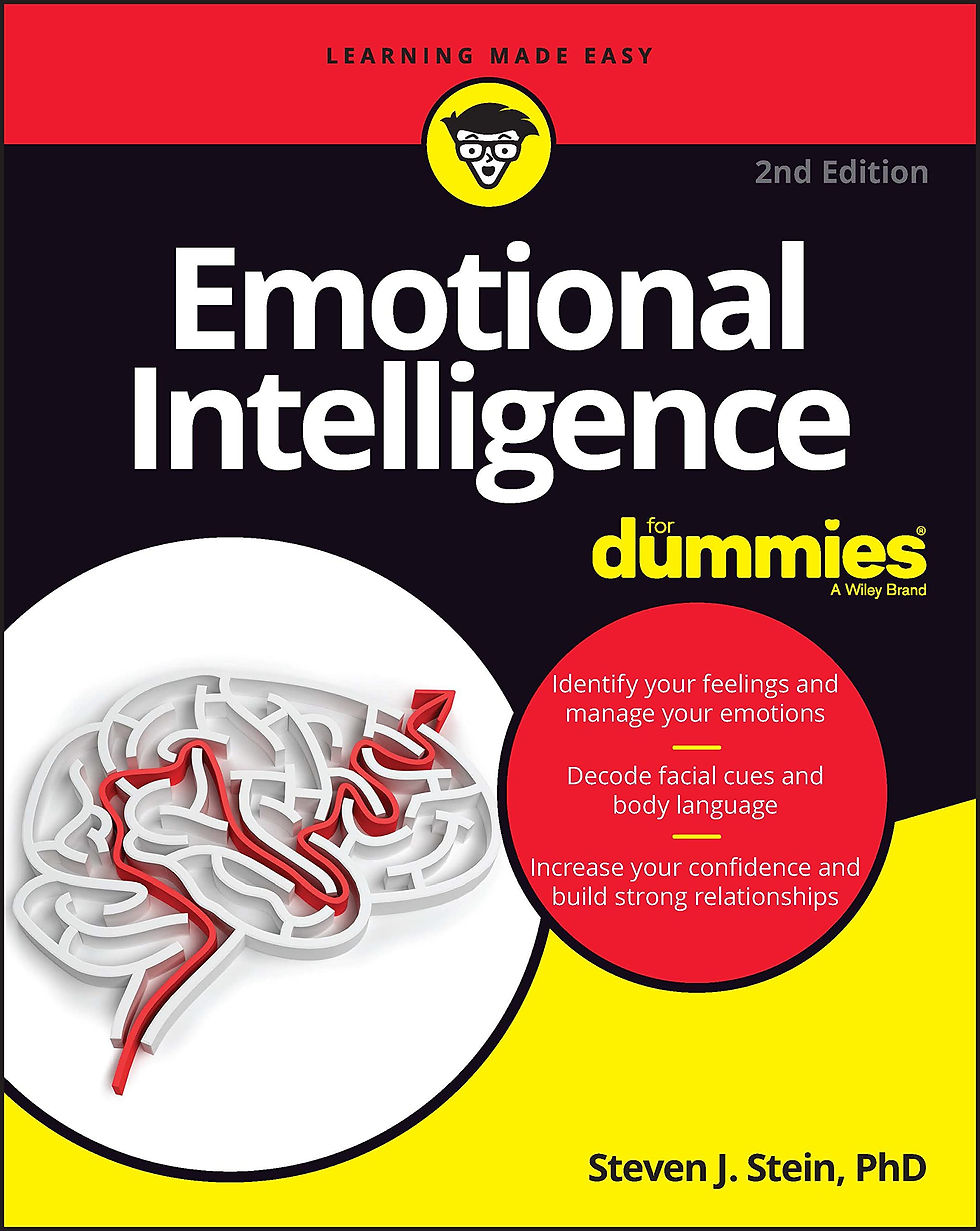Behind the Scenes of Psychology and Reality TV: A Conversation with Dr. Steven Stein
- Dr. John Lee
- Mar 7
- 8 min read
Updated: Mar 15
7-minute read

How I First Met Dr.Stein
I first met Dr. Stein last year when he reached out to members of the Ontario Psychological Association about consulting for a reality TV show filmed in Toronto. At the time, the project was only known by its codename, Project Greenlight. It wasn’t until later that we learned it would be called Beast Games, now streaming on Amazon Prime, featuring Mr. Beast, the world’s most prolific YouTuber.
The experience was one of the most fascinating and unique professional opportunities I’ve had. Psychologists from diverse backgrounds, mostly based in Toronto, came together to support this massive production. The show started with a thousand contestants and was filmed at Downsview Park. The sheer scale of the production—the massive set, number of staff, the vast resources, and the level of organization and coordination —was astounding.

While everyone involved signed an NDA and cannot disclose details about specific contestants, it was incredible to observe the psychological dynamics at play. The show functioned as a large-scale social experiment, revealing fundamental aspects of human nature. It showcased how people behaved in intense social settings where money wasn’t always the sole motivator. It also showed me how essential psychological support was in helping contestants navigate high-stress and high-stakes environments, and to help process things when they were eliminated.
This world was entirely new to me, and I knew we had to bring Dr. Stein onto the podcast to share his remarkable journey into this field. While this may be the flashiest aspect of his work, it was made possible through his decades of dedication—building a successful psychological assessment business, pioneering research in emotional intelligence and hardiness, and maintaining an unwavering commitment to a meaningful and purposeful career.
Dr. Stein's Journey as a Psychologist
Dr. Steven Stein’s journey as a psychologist began with his education at the University of Toronto, where he earned a B.Sc. in Psychology, followed by a Master’s and Ph.D. from the University of Ottawa.
In 1984, he founded Multi-Health Systems (MHS), a company that has become a leader in psychological assessments. Through MHS, Dr. Stein revolutionized the way emotional intelligence and psychological assessments are used in organizations. His expertise has led him to consult with military and government agencies like the Canadian Forces and FBI Academy, as well as major corporations like Coca-Cola and Air Canada.

Dr. Stein’s influence extends to reality TV, where he provides psychological assessments for shows like Big Brother Canada and The Amazing Race Canada. As an author, he co-wrote The EQ Edge and Emotional Intelligence for Dummies, sharing his knowledge on

emotional intelligence with a global audience.
How Dr. Stein started MHS
Dr. Steven Stein’s journey to founding Multi-Health Systems (MHS) took an unexpected turn during his time at Thistletown Regional Center, one of Ontario’s largest children's mental health facilities. He was conducting a research study comparing cognitive behavior therapy (CBT) with traditional behavior therapy for kids with conduct disorder, but there was one major hurdle: the children didn’t like the psychological testing. Frustrated, Dr. Stein found an unlikely solution. Around the same time, personal computers were emerging, and he noticed the kids were “getting into this thing,” playing with it for hours.
He thought, “What if we put some of our tests onto this computer?”
He hired a programmer, and soon the kids were lining up outside his office, eager to take the computerized tests. The results were outstanding. Dr. Stein and his team uncovered critical information—such as suicide attempts, drug use, and sexual abuse—that had been missing from the children’s case histories. As he put it,
“We discovered more in a one-hour computerized interview than reams and reams of psychological psychiatric reports.”

This discovery earned media attention, and Dr. Stein thought he was about to revolutionize psychology. However, when he suggested shifting his research focus, the center wasn’t interested. Determined to continue, he and his wife, Rodine, decided to pursue the idea themselves, starting the business in their basement while she was on maternity leave.
Though he had no formal business training, Dr. Stein’s leap into the business world led to the creation of MHS, which would go on to change the landscape of psychological assessments. As he reflects, “I never took a single business course,” but his passion for innovation and his commitment to improving psychological practice drove him to success.
His Work on Emotional Intelligence
Dr. Steven Stein’s work on emotional intelligence (EQ) has transformed how we approach relationships, both personally and professionally. According to Dr. Stein, EQ is the ability to understand and manage your own emotions while empathizing with others. He believes that
“With a higher EQ, you can really maneuver social situations”
— a crucial skill in today’s interconnected world. Unlike IQ, which tends to be fixed, EQ is something that can be developed with practice.
In fact, Dr. Stein argues that while high IQ can open doors in academic and cognitive fields, EQ is what helps you rise through life’s different levels.
“IQ gets you in the door, but EQ gets you upstairs.”
Dr. Stein’s books, The EQ Edge and Emotional Intelligence for Dummies, have brought EQ to a broader audience, showing how mastering emotional intelligence can help leaders and teams succeed. His work with major organizations highlights the importance of EQ in fostering strong, productive environments. Through his research and insights, Dr. Stein has proven that, while some may have naturally high emotional intelligence, anyone can improve their EQ with the right tools and mindset.
The Emoji Test

When Dr. Steven Stein interpreted a series of emojis during our podcast, his approach reflected his deep understanding of traditional emotional expressions. For instance, he saw the "crying-laughing" emoji as a straightforward symbol of humor. However, when we compared his interpretations to those of Gen Z, it was clear that the younger generation uses emojis in more sarcastic and ironic ways.
Dr. Stein was intrigued by this shift, as it highlighted how digital communication is constantly evolving. This exercise reminded him that emotional intelligence isn’t just about understanding emotions in a conventional way—it’s also about adapting to how people express themselves in new and creative forms.
Dr. Stein's Role with Reality TV
Dr. Stein's role with Reality TV focuses on candidate selection and analyzing how individuals handle high-pressure situations. For Dr. Stein, reality TV offers a "live laboratory" where the behaviors of contestants are exposed in real-time, revealing how they react under stress and navigate social dynamics. His time working with these shows has also deepened his appreciation for emotional intelligence (EQ).
Dr. Stein has contributed to these popular shows and many more
Dr. Stein observes that contestants with high EQ tend to excel in social interactions and handle challenges more effectively. They can manage their emotions, read others' feelings, and use this understanding to make strategic decisions. This has become especially evident in shows like The Amazing Race, where some contestants use emotional awareness to lead or collaborate.
Through his work, Dr. Stein has seen firsthand how crucial EQ is in both competitive environments and everyday life. Reality TV contestants with higher emotional intelligence are often the ones who can adapt to new social situations and navigate the complexities of group dynamics. In this setting, EQ is as vital as any physical or intellectual skill, demonstrating how important emotional awareness is for success, especially in high-stakes scenarios.
Dr. Stein's Advice for Students
Dr. Steven Stein’s advice for psychology students is rooted in passion, self-discovery, and resilience. He emphasizes the importance of managing expectations early in your career, noting that many students are driven by the desire for immediate success or clarity.
“Are you there to learn, or are you there for the paycheck?” Dr. Stein asks.
This is crucial, because your first job, no matter how it turns out, is a stepping stone. He encourages students to give themselves the time to grow, even if things aren’t perfect at first. “Don’t quit too early,” he advises. “Use those experiences to understand what you want in the next phase of your career.”
For those feeling lost or unsure about their next steps, Dr. Stein’s advice is powerful:
“Find your passion. Even if it’s not clear right away, you’ll get there.”
He explains that psychology offers an endless range of opportunities, and the key to success lies in self-awareness. Understanding what excites you – whether it’s social justice, neuropsychology, or organizational psychology – will guide you to where you truly belong.
“Psychology fits into so many aspects of life. The challenge is finding your fit,” he says.
He urges students to embrace every opportunity, even if it’s not exactly what they envisioned.
“You have to get started, but while you’re there, continue learning,” he says. “Let every experience be a stepping stone to your ultimate goal.”
Dr. Stein’s message is clear: it’s about passion, perseverance, and pivoting when the time is right. With the right mindset, students can not only navigate their early careers but also thrive in a world of limitless possibilities.

His Thoughts on Money and Happiness
Dr. Steven Stein offers a refreshing perspective on the connection between money and happiness, noting that while money can certainly provide comfort, it’s not the ultimate source of joy.
“Money is kind of a cushion.” “It prevents unhappiness by eliminating stressors like hunger or bad living conditions, but it’s not the road to happiness.”
Dr. Stein highlights that true happiness comes from more meaningful pursuits, like having a purpose and achieving accomplishments.
Reflecting on his own life, he shares, “In the early days, I didn’t have a lot of money. Now, I have more than I ever imagined, but I’m no happier today because of it. What matters more to me is the freedom to pursue what I want to do.”
For Dr. Stein, the key to happiness lies in living a fulfilling life where he can follow his passions, not in amassing wealth.
However, he also acknowledges that financial stability can provide the freedom to pursue these passions. “Money is a vehicle to get you there,” he says, emphasizing the importance of using money wisely to support what truly matters in life.
When discussing the financial side of psychology careers, Dr. Stein believes there’s no limit to what you can achieve as an entrepreneur. “If you choose the right path and keep pushing forward, your income will follow,” he says. For Dr. Stein, success is found in following your passion and being willing to take risks to reach your goals.

Dr. John W Lee and Uma Hopen









What an interesting and intruiging topic!! So cool